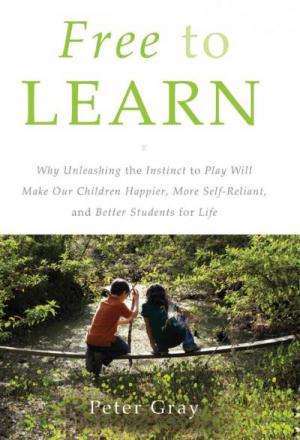'Free play' is vital to children's healthy development, psychologist says

The importance of play—crucial for children's healthy psychological development and ability to thrive in life—is woefully underestimated by parents and educators, according to Peter Gray, a Boston College developmental psychologist and author of the new book Free to Learn: Why Unleashing the Instinct to Play Will Make Our Children Happier, More Self-Reliant, and Better Students for Life.
"Playing with other children, away from adults, is how children learn to make their own decisions, control their emotions and impulses, see from others' perspectives, negotiate differences with others, and make friends," says Gray, an expert on the evolution of play and its vital role in child development. "In short, play is how children learn to take control of their lives."
All children are born with an innate curiosity, playfulness, sociability and deep desire to learn, but at some point after they enter school, what was once fun and engaging begins to feel forced, he explains. And, anxiety and stress levels among youths are at an all-time high: they are bogged down with homework, over-scheduled with extracurricular activities, deprived of free play, and faced with the pressures of getting into a top college.
"How did we come to the conclusion that the best way to educate students is to force them into a setting where they are bored, unhappy and anxious?" Gray asks. "Our compulsory education system features forced lessons, standardized tests, and seems specially designed to crush a child's innate and biological drives for learning." The traditional "coercive" school model, he adds, was originally developed to indoctrinate, not to promote intellectual growth.
Free to Learn outlines the difference between structured play (Little League) and free play (a pickup game of baseball) and emphasizes the need for the latter in society worldwide.
Among reasons he outlines for the disappearance of free, unstructured play: a decline in families knowing their neighbors and a rise in parents' fearing dangers to children who are not under adult supervision, which Gray says comes partly from exaggerated media reports; increased time in school, at homework and in adult-directed activities outside of school; and most significantly, a rise in the societal attitude that childhood is a time for résumé building and that free play is wasted time.
He presents scientific evidence that self-directed learning and free play permit children to realize their optimum abilities to learn, grow, and develop naturally and positively. Gray also shows how the hunter-gatherer way—where children spend their days in mixed-age groups, engaging in self-directed play and exploration—leads to the development of socially, intellectually, and emotionally healthy adults.
His book offers the less examined path, according to its publisher, "and perhaps the key to repairing our broken education system—returning joy, fun, and excitement to learning and education through the power of play and self-directed learning and exploration."
But schools, Gray notes, aren't only to blame for the decline in play—due to parental fears, outdoor play has declined significantly in recent decades. He cites a direct correlation between the decline of play and the rise in emotional and social disorders among young people, and outlines what parents and communities can do to promote and reinstitute play in children's lives.
"I present compelling evidence that over the past 50 years—as children's opportunities for free play and exploration have declined—there has been a dramatic rise in anxiety, depression, and suicide in young people, who have not had the opportunity that free play provides to find meaning and joy in life."
Free to Learn—which suggests that it's time to stop asking what's wrong with our children, and start asking what's wrong with the system—has earned acclaim from prominent psychologists, anthropologist and evolutionary biologists.
"Peter Gray is one of the world's experts on the evolution of childhood play, and applies his encyclopedic knowledge of psychology, and his humane voice, to the pressing issue of educational reform," according to Steven Pinker, Harvard College Professor of Psychology and author of How the Mind Works.
Boston College Professor Peter Gray
A professor of psychology at BC for more than 40 years, in 2002 Gray retired from his position as full professor and assumed that of research professor. He is the author of Psychology, a widely-used psychology textbook, has published numerous scholarly articles on the role of play in education, and writes a blog, "Freedom to Learn," for Psychology Today magazine.
Initially motivated by his son's struggles in a structured school environment, Gray altered his professional focus to study education from a biological perspective. He frequently speaks on play and education at national conferences and university colloquia.
More information: Basic Books, March 2013: www.FreeToLearnBook.com















